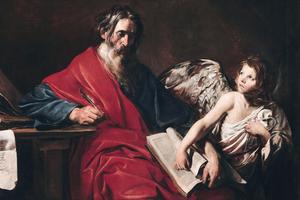The Great Gift of God’s Mercy
User’s Guide to Sunday, April 11, Divine Mercy Sunday

Sunday, April 11, is Divine Mercy Sunday. Mass Readings: Acts 4:32-35; Psalm 118:2-4, 13-15, 22-24; 1 John 5:1-6; John 20:19-31.
Happy Divine Mercy Sunday, everyone! The Second Sunday of Easter was designated Divine Mercy Sunday by Pope St. John Paul II on April 30, 2000 — the same day he canonized St. Faustina Kowalska, the visionary nun whom Jesus used to give us the Divine Mercy devotion. The theme of mercy runs through our readings.
Our first reading this Sunday (Acts 4:32-35) describes how, in the very early Church, they had “everything in common,” and there was “no needy person among them.” We need to remember that believers commune not only in spiritual goods, like prayers and merits, but also in material goods, our money and other resources.
God shows mercy through us, so each one of us needs to take an active concern for the material well-being of other Christians, beginning with our family, then our parish, our community and ultimately worldwide. As the Church grew and spread, having everything in common was unworkable, so Christians brought their excess to each Eucharist, and the bishop distributed it to the needy. That is the origin of taking up a collection during Mass; it is an expression of our solidarity with other Christians as a family that shares its goods. We should try to bring some cash to church with us to participate in this ritual, even if our main giving is done electronically.
Our Psalm is already familiar to us: Psalm 118, the great Easter Psalm, is the last Psalm chanted by Jesus in the Upper Room before the Passion. Its theme is “God’s mercy endures forever,” a great reminder for Divine Mercy Sunday.
Our second reading (1 John 5:1-6) speaks of Jesus coming “through water and blood,” a reference to the flow from the heart of Jesus at the cross (John 19:34). The famous Divine Mercy image reflects that event on the cross, showing Jesus’ mercy as two rays of light from his heart, one red and one white. The flow of blood and water from Jesus’ heart is a sign of the Holy Spirit, which comes to us through the sacraments: Eucharistic blood and baptismal water. The Holy Spirit is God’s gift of mercy to us, and we experience the Spirit in the sacraments.
Our Gospel recounts Jesus appearing to the apostles in the Upper Room (John 20:19-31). This is where Jesus had taught them about the Holy Spirit during the Last Supper (John 14-17). Now Jesus “reconvenes class” with his “students” in the Upper Room for the great finale, when he gives them the very thing about which he had been teaching: the Spirit. “He breathed on them and said to them, ‘Receive the Holy Spirit. Whose sins you forgive are forgiven them. Whose sins you retain are retained.’”
By this act, Jesus transforms the apostles into priests of the New Covenant. In the Old Covenant, it was up to the priests to administer the forgiveness of sins, or refuse to do so (see Leviticus 5:5-6,10; Leviticus 4:20, 26, 31, 35; 5:13, 16, 18; 6:7; 19:22; Numbers 15:25). Now, this priestly role is given to the apostles by Jesus. They will administer God’s mercy by forgiving sin.
In the Book of Acts, we see the apostles sharing their priestly authority with other men who were called presbyteroi or episkopoi in Greek (see Acts 14:23; Acts 20:17, 28). These Greek words for men appointed by the apostles became the English words “priest” and “bishop.”
So to this day, our priests and bishops still perform the priestly role of sharing God’s mercy with his people, especially in the confessional. If it has been a while for you, these coming days are a great opportunity to return to confession — and to invite a friend to come, too.
- Keywords:
- john bergsma
- user’s guide to sunday
- user's guide to sunday
- divine mercy
- divine mercy sunday
- mercy of god

















